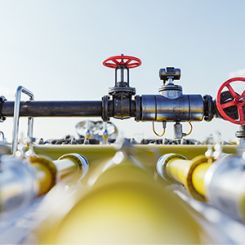Infrastructure projects across the U.S. are not facing approval challenges lately as lawmakers give bipartisan support to funding. However, some projects may have another hurdle to jump—cost increases because of President Donald Trump’s steel tariffs.
News outlets reported earlier this week that a wastewater treatment plant in Utah, a river cleanup project in Michigan and a flood-control project in New Hampshire have seen costs rise thanks to the steel tariffs.
According to The Herald Journal in Logan, Utah, the original cost estimate for the regional wastewater treatment plant came in at $106 million. This summer, the cost estimate rose to $131 million, citing rising construction costs and the steel tariffs as reasons for the increase.
The cleanup of the Lower Rogue River—Old Channel in Detroit is a joint project between the U.S. Environmental Protection Agency’s (EPA) Great Lakes National Program Office and Honeywell Inc. The three-quarter-mile stretch has been contaminated from industrial waste discharge. After a 2,500-foot-long sheet-pile bulkhead wall is installed to support the riverbank, polluted river sediment and debris will be removed, according to Bloomberg. However, the cost of the steel for the wall has risen by $1.3 million because of the steel tariffs.
The Wall Street Journal reported a flood-control project came in $1.5 million higher than the $3.3 million estimate in Dover, New Hampshire. City officials now have to rework the 2019 capital improvement budget, for which they may have to consider making cuts or forgoing other projects.
According to The Wall Street Journal, the Bureau of Labor Statistics reported that through October the price of diesel fuel was up 27 percent, asphalt paving mixtures were up 11.6 percent and steel mill products were up 18.2 percent, all compared with a year ago. Analysts say the 25-percent tariffs on steel imported from China and other countries have given domestic steel makers leverage to raise their own prices.
Trump imposed the steel tariffs in March and, according to The Hill, has kept them in place since then to “ensure fair trade deals with other countries.”
According to Bloomberg BNA, cities and towns must use U.S.-manufactured steel to fix up aging parts of water and wastewater plants and collection systems if they have funding through low-interest loans under a revolving loan fund program. But even though the funding can be used for drinking water, clean water or projects initiated under the Water Infrastructure Finance Innovation Act, Bloomberg BNA reports the tariffs will still drive up the prices of steel and aluminum prices.

